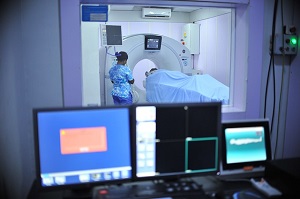Is a Fallopian Tube Examination Painful?
The fallopian tubes are essential to the female reproductive system, transporting eggs from the ovaries to the uterus. If there is blockage, adhesions, or other abnormalities in the fallopian tubes, it may lead to problems such as infertility or ectopic pregnancy. Doctors will use specific examination methods to evaluate the health status of the fallopian tubes.

So, is tubal examination painful or not? This largely depends on an individual's pain threshold, patency of the fallopian tubes, and psychological state during examination:
1. Condition of the fallopian tubes
If the fallopian tubes are completely unobstructed, the liquid or contrast agent used in the examination can pass through smoothly, causing minimal pressure and typically only slight discomfort, such as brief lower abdominal cramping.
However, if there are blockages, adhesions, or narrow passages in the fallopian tubes, the liquid or contrast agent may be obstructed, increasing the internal pressure and causing more noticeable pain.
2. Personal pain threshold
Pain sensitivity and tolerance vary significantly among individuals. Women with a high pain threshold may not feel significant pain during the examination or may find the discomfort bearable.
Conversely, women with a low pain threshold might find even minor stimuli intolerably painful.
3. Psychological state during the examination
Excessive tension, anxiety, and fear can cause muscle tightness and heightened nerve sensitivity, amplifying discomfort during the examination and increasing the perception of pain.
On the other hand, women who are relaxed and emotionally stable are better able to adapt to the stimuli from the examination, experiencing relatively less pain.
4. Choice of examination method
The level of pain associated with different fallopian tube examination methods can vary. For example, a tubal patency test (hysterosalpingography) is relatively simple and may cause only mild discomfort.
Hysterosalpingography (HSG), which involves injecting a contrast agent, may cause slightly more discomfort. Laparoscopy, performed under general anesthesia, generally causes no pain during the procedure, but there may be some pain postoperatively.
5. Uterine position and shape
The position and shape of the uterus can affect the insertion and manipulation of the examination instruments, potentially increasing the difficulty of the procedure and the level of pain. A retroverted uterus or uterine abnormalities may complicate the examination and intensify pain.
6. Physiological state during the examination
The stage of the menstrual cycle can also impact pain levels. For instance, a thicker endometrium or pelvic inflammation during certain cycle phases may exacerbate the pain sensation.
Additionally, an experienced and skilled doctor can conduct the examination more accurately and gently, minimizing unnecessary stimulation and damage, thus reducing the patient's perception of pain.
To alleviate discomfort during the examination, patients can take several preparatory steps. Firstly, they should relax and trust the doctor's expertise. Secondly, they should follow the doctor's pre-examination instructions, such as maintaining good hygiene and avoiding sexual activity.
In summary, fallopian tube examinations are not necessarily painful and are crucial for diagnosing and treating female reproductive system disorders.
Patients should not be overly fearful or anxious if a doctor recommends a fallopian tube examination. Instead, they should cooperate with the doctor to obtain accurate diagnostic results and effective treatment plans. Traditional Chinese Medicine, such as the Fuyan Pill, can effectively treat mild conditions such as tubal inflammation, adhesions, blockages, or hydrosalpinx.
For those still concerned about fallopian tube examinations, it is advisable to consult a professional gynecologist. The doctor can provide detailed and personalized advice based on the individual's situation. It is also essential to emphasize that fallopian tube examinations should be conducted in a reputable hospital to ensure the safety and accuracy of the procedure.
You may also be interested in:
Protecting Your Fallopian Tubes: Take 3 Essential Actions to Prevent Tubal Pregnancy
How Do Fallopian Tube Adhesions Occur and What Are the Treatment Options?
Which Inflammations Will Cause Fallopian Tube Blockage?
previous pageWhy is Laparoscopy Not Recommended for Hydrosalpinx?
next page- Is Fallopian Tube Blockage Causing Your Lower Abdominal Pain?
- Hydrosalpinx and IVF: What Are the Chances of Successful Embryo Implantation?
- Resistance During Fallopian Tube Examination May Indicate Mild Blockage
- What Should Patients with Fallopian Tube Blockage Pay Attention to in Their Daily Life?
- Mild Fallopian Tube Blockage: Exercise and Heat Therapy as Adjunct Treatments
Testimonials
- Adenomyosis with Ureaplasma Urealyticum Cured by Fuyan Pill
- Tubal blockage with hydrosalpinx can be cured by TCM shortly
- Fuyan Pill Helps A woman with Adenomyosis Get Pregnant
- A Woman with Hydrosalpinx Is Cured with Fuyan pill
- Pelvic Inflammatory Disease Testimonials
- Irregular Vaginal Bleeding and Endometrial Thickening Cured by Fuyan Pill
- Pruritus Vulvae and Frequent Urination: Mycoplasma Infection Cured after 2 Courses



